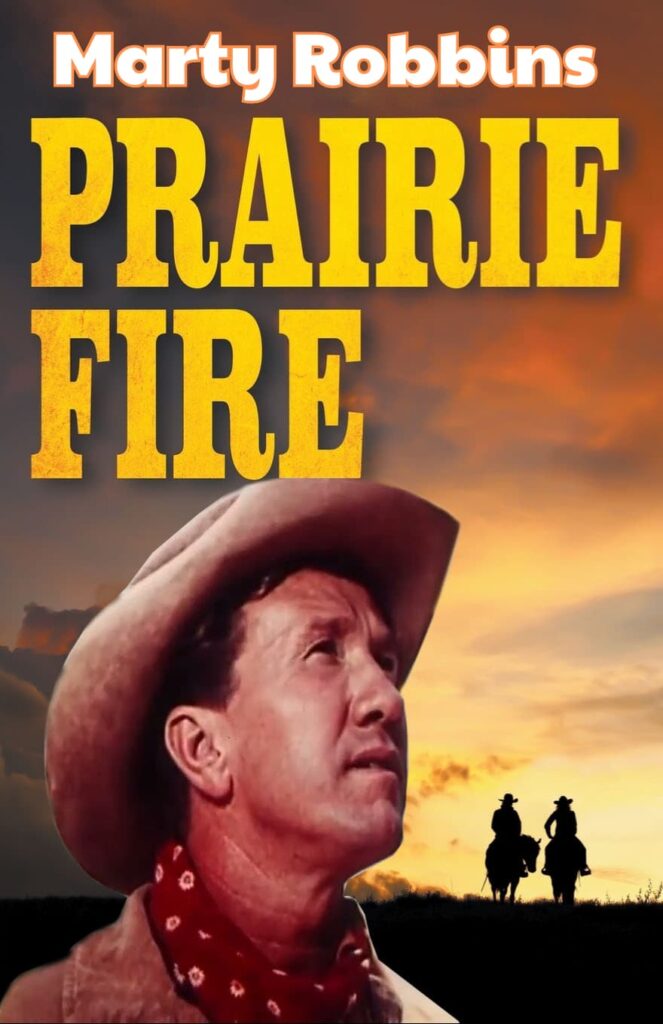
A desperate chase against a merciless force of nature.
The crackling sound of an old vinyl record, the gentle hiss that precedes the music—for those of us who came of age with these timeless songs, it’s the very sound of memory itself. It takes us back to a time when storytelling was a craft as revered as musicianship, when a three-minute song could transport you to a world of cowboys, gunfights, and the vast, untamed American West. And no one did it better than Marty Robbins. In the pantheon of his gunfighter ballads, a song that stands out for its sheer, breathless drama is “Prairie Fire.”
Released in 1960 on the album “More Gunfighter Ballads and Trail Songs,” this track wasn’t a smash hit on the level of his signature song “El Paso,” but its impact on the hearts of those who heard it was just as profound. Unlike “El Paso,” which topped both the Billboard Hot 100 and Country charts, “Prairie Fire” was a deep cut that gained its reputation through the strength of its narrative and the artistry of its performance. It’s a testament to the album’s overall quality and the enduring appeal of the western saga. This wasn’t just music; it was an audio movie, a vivid scene painted with a masterful hand.
The story behind “Prairie Fire” is a classic tale of man versus nature, a frantic race against an unstoppable force. Written by Joe Babcock, the song tells the first-person account of a cowboy and his companions, caught in the open plains with a monstrous prairie fire roaring down on them. From the moment the narrator sees “a black cloud in the west,” the tension is palpable. The lyrics don’t just describe the scene; they thrust the listener into the heart of the action. You can feel the heat, smell the smoke, and hear the panicked thundering of hooves as the men and their horses push themselves to their absolute limit. The song’s genius lies in its relentless pace, mirroring the desperate sprint for survival. There’s no chorus to slow things down, just a continuous, winding narrative that propels the story forward, breathlessly.
The true meaning of the song goes deeper than a simple flight from danger. It’s a meditation on fate, on the humbling power of the natural world, and on the fleeting nature of life itself. The men are not fighting another gunslinger or an outlaw; they are up against a primal force that cares nothing for their courage or their skill. It’s an equalizer. The song’s climax, where they realize they have “lost that fatal race,” is not just a moment of defeat, but of quiet, resigned acceptance. In the end, the river, a symbol of life and salvation, is “subdued” of its rage, but it is too late for the men. It’s a stark, powerful reminder that some battles, no matter how bravely fought, cannot be won.
The song’s performance is a masterclass in controlled emotion. Marty Robbins’s voice, always so rich and resonant, takes on a new urgency here. He delivers the story not with theatrics, but with a weary, almost resigned tone that makes the tragedy all the more real. The sparse but effective instrumentation, particularly the haunting guitar work by the legendary Grady Martin, complements the narrative perfectly, creating a sense of vast, empty space and the smallness of man within it. It’s a song that proves that true country music, at its best, isn’t just about a three-chord structure and a simple rhyme; it’s about a universal human experience, told with a depth and honesty that makes you feel it in your bones. Even today, listening to “Prairie Fire” is a visceral experience—a reminder of a time when songs were stories, and stories were everything.